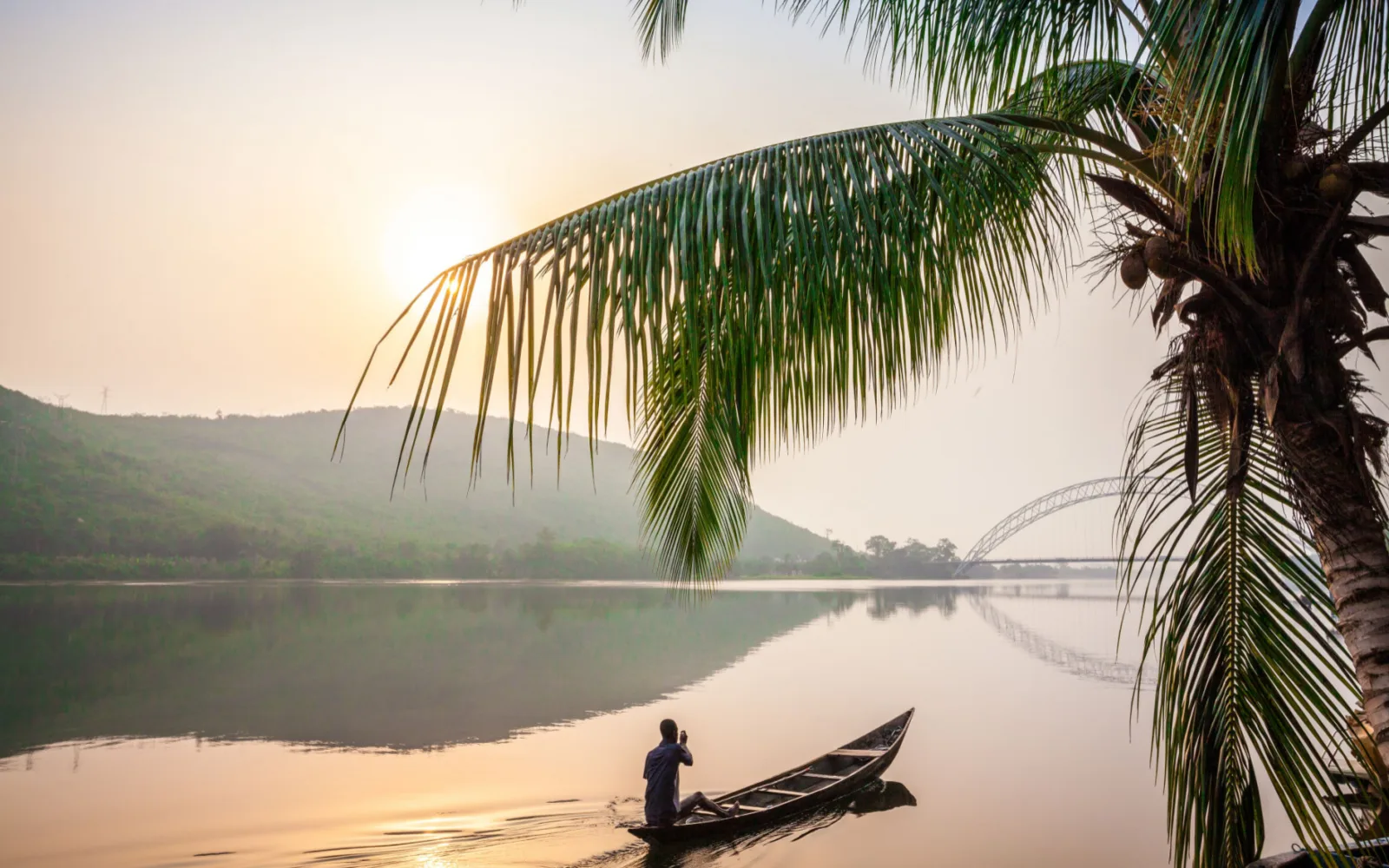The vibrant West African country of Ghana is one of the continent’s most popular tourist destinations. Visitors flock here to see beautiful tropical landscapes such as Kakum National Park and historical landmarks such as Elmina Castle.
In 2019, the government launched a campaign called the “Year of Return” to attract Africans and descendants of enslaved Africans to visit Ghana and get in touch with their heritage (Ghana was sadly one of the centers of the transatlantic slave trade when it first began).
That year alone, over 1 million visitors came to the country. It certainly seems like an attractive destination, but savvy travelers know that there is a lot of thought that needs to go into planning a trip.
So, is Ghana safe to visit, or are you better off avoiding this culture-rich country? Here’s our take.
Is Ghana Safe to Visit in 2024?
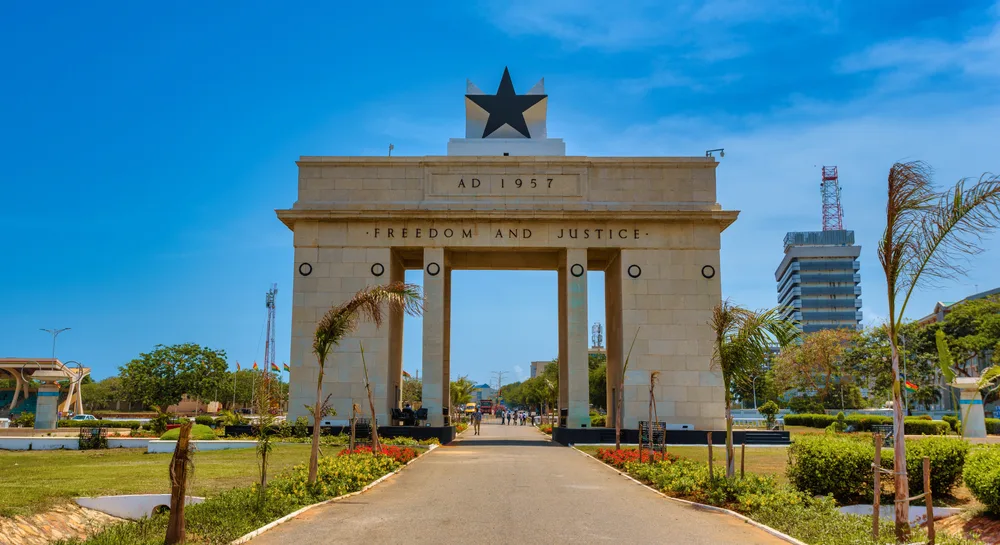
Truba7113/Shutterstock
Yes and no. Ghana is mostly safe to visit, but you should still be on alert when you are moving around due to elevated levels of crime.
Petty crime is the most prevalent, but there are also growing incidents of violent crime that are, unfortunately, affecting foreigners. There is some civil unrest in Ghana, but not so much that it is the primary concern for most people who visit.
For example, the Canadian government explains that unrest sometimes erupts during local chieftaincy disputes (many tribes in Ghana still stick to a traditional leadership system with chieftains).
One such dispute is ongoing in the Bawku region, and they sometimes break out in Upper East, Upper West, and Volta regions. Stay alert to local news and emergency warnings, as sometimes the government imposes curfews to try and contain the situation.
You should also avoid traveling to Ghana’s far north, near the border with Burkina Faso. Burkina Faso is suffering through a wave of Islamic terrorism and violent counterterrorism crackdowns, both of which affect civilians.
The attacks sometimes bleed over the border into the northern region of Ghana, which is the only part of the country with an elevated terrorism risk.
While most incidents of political violence occur in certain regions of Ghana, civil unrest can happen anywhere. Ghana’s economy has taken a hit since 2020, and many people are deeply unsatisfied with their quality of life, leading to frequent protests.
When you see protests, get out of the area immediately, as the government response has been violent in the past. It’s worth knowing about the civil unrest situation in Ghana, but this is hardly your biggest problem when visiting the country.
A far bigger concern is crime. Most government advisories, including the one from the United States, advise their citizens to exercise increased caution in Ghana due to elevated crime rates.
Common crimes in Ghana include:
- Carjacking
- Mugging
- Petty theft
- Assault
- Armed robbery
- Kidnapping
- Scams
Make sure that you are alert to these potential dangers in Ghana, but don’t let your nervousness ruin your vacation.
Crime in Ghana
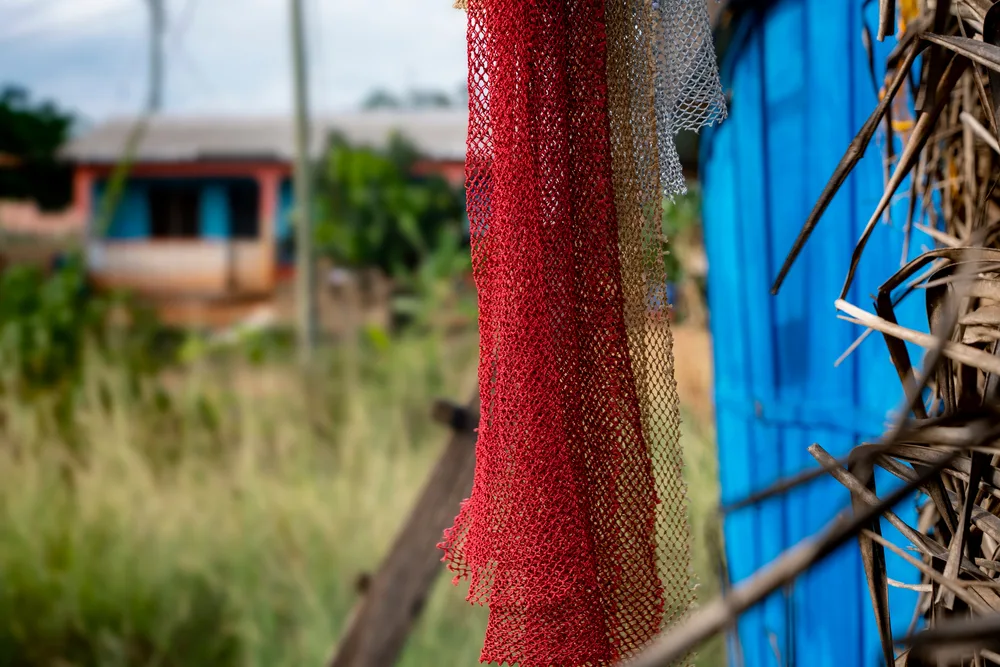
James Dalrymple/Shutterstock
The primary concern for most visitors headed to Ghana is crime — and with good reason. The crime rate is elevated and has only been increasing over the past few years, which is why many governments advise their citizens to exercise increased caution when they travel to this African country.
According to Statista, Ghana scores 44.5 out of 100 on the crime index. This is a moderately high crime rate, but not the worst in the world and far from the worst on the African continent.
After a few years of increasing criminality, according to this statistic, the crime rate in Ghana is actually decreasing. This rate is reflected in public opinion surveys.
According to Cost of Living, the overall level of crime according to Ghana residents and ex-pats is moderate. The crime people worry about most option is of an official nature — crime and bribery.
Ghana definitely has problems with regard to crime. Anecdotal evidence says that violent crime is increasing, and many foreign governments report that their embassies are receiving more and more reports of violent crime against foreign citizens.
You can read about those reports in travel advisories issued by your home country. A lot of violent incidents in Ghana are connected to the unfortunately growing organized crime sector.
Criminal groups are behind a flourishing illegal human trafficking network as well as the growing arms trade, according to the Organized Crime Index.
The government attempted to respond with strict weapons controls, which faced pushback from local tribal groups that incorporate ceremonial weapons into their lives and which only pushed the weapons trade underground. The prevalence of illegal weapons contributes to the growth of violent crime in Ghana.
However, not all is bad when it comes to Ghana’s crime rate. According to the World Bank, the homicide rate is a measly two incidents per 100,000 people, which is lower than in most cities in the United States.
While crimes against people aren’t as high in Ghana, property crime rates are high and increasing in Ghana. Experts cite growing poverty and economic inequality as the main driving forces behind this increase in crime.
Many robberies turn violent due to the presence of weapons. It’s worth mentioning the risk of sexual assault.
Although it isn’t very prevalent, there have been incidents of criminals preying on foreign women. Avoid walking alone at night or in secluded areas during the day, and trust your instincts if a situation feels dangerous.
Petty Theft
The most common crime tourists encounter when abroad anywhere, including Ghana, is petty theft. While fewer people have the hardened character necessary to be a violent criminal, it’s a lot easier to seize the opportunity of a distracted tourist and grab something valuable.
Keep in mind that the income gap between most local Ghanaians and visitors is vast, so one person’s iPhone could mean someone else’s entire monthly income.
Petty theft in Ghana can occur anywhere but is most common in bigger cities, at popular tourist destinations, and on public transportation. Crowded areas such as markets, beaches, and parks are also peak attractions for pickpockets, according to Canadian government advice.
Bag snatchers also operate in these areas and on crowded roads. Many operate on motorcycles — one person, usually a man, will grab an unsuspecting victim’s bag from the back of a motorcycle while the other drives away.
Wherever you go, make sure that you keep a secure grip on your valuables and never let them out of sight, even in places where you feel safer, such as hotel lobbies and airports — remember that those are still public areas.
Limit the amount of cash you carry each day and always have an emergency stash elsewhere. Don’t attract attention by wearing flashy jewelry or carrying expensive electronics around. Take photos with your camera or phone, then put it securely in your bag.
Scams are also very common in Ghana. Be careful of people impersonating police officers or other officials at airports and on the road and asking tourists to pay fines.
The UK government advises its citizens to always ask for an ID to confirm that someone is a real officer — and make sure the ID has a photo that matches the person who is talking to you.
Other common scams operate online. Be careful if an online friend or romantic interest asks you for money or to visit them in Ghana or if someone contacts you offering a great business opportunity.
Armed Robbery
A far more serious type of crime that often affects foreigners in Ghana is armed robbery. This is the most common violent crime that tourists have to deal with, and sadly it is increasing in frequency.
The US government warns that the most common type of armed robberies are carjacking and muggings. Carjacking, in particular, is becoming more and more common. Thieves will target drivers as they park or attack passengers in cars that are sitting in traffic.
The good news is that the vast majority of these attacks happen at night, so as long as you avoid driving after 6:30 PM and make sure to only travel with reputable taxi drivers who know which roads are safe, you should avoid this danger.
Burglaries are also increasing in frequency, especially in areas where Westerners live. Some break-ins escalated into kidnappings.
While most victims so far have been ex-pats living in Ghana, some tourists have been targeted at their accommodations. Make sure that you book your accommodations at a hotel with good security.
Avoiding Bad Areas
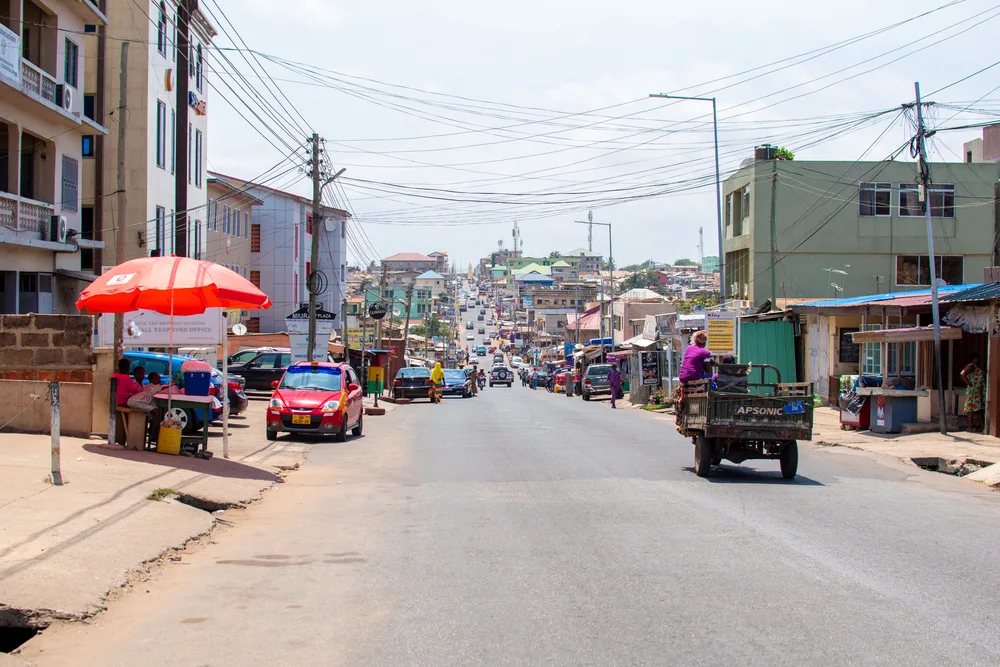
Delali Adogla-Bessa/Shutterstock
A lot of your risks in Ghana automatically lower if you make sure to avoid bad areas. Certain regions and neighborhoods in big cities have higher crime rates than others, so learn where to go and where to avoid.
Avoid traveling to the north of Ghana, as unrest from Burkina Faso is spilling across the border with that country. The Upper East and Upper West regions see higher levels of civil unrest, as do parts of the Bono, Bono East, and Savannah regions.
Accra is Ghana’s capital and biggest city, which also means it has a lot of crime. Certain Ghana neighborhoods have very high crime rates, including Agbogblsohie, Avenor, Ashaiman, Nima, and Sukura.
Kumasi is another big Ghanaian city and another one with a reputation for having some rougher areas. Avoid the neighborhoods of Asawasi, Bantama, and Asafo.
Some roads are prone to carjacking, so you should avoid them. These include the Tamale–Wa Road and several roads in the greater Accra area, including Graphic Road, George Walker Bush Highway, and the roads around Labadi beach.
Things to Consider
Here are a few other tips to help you stay safe in Accra:
- Beaches are also popular targets for criminals, so avoid hanging out on deserted beaches alone.
- If you explore Ghana’s nature, be aware of dangerous local animals such as snakes, black widow spiders, and bats.
- During the rainy season, from March to November, certain regions experience flooding. Check weather reports, especially in the north of the country.
- Ghana is not safe for travelers who are openly LGBT due to homophobic laws and conservative local attitudes. Reconsider travel if you identify as LGBT.
Frequently Asked Questions
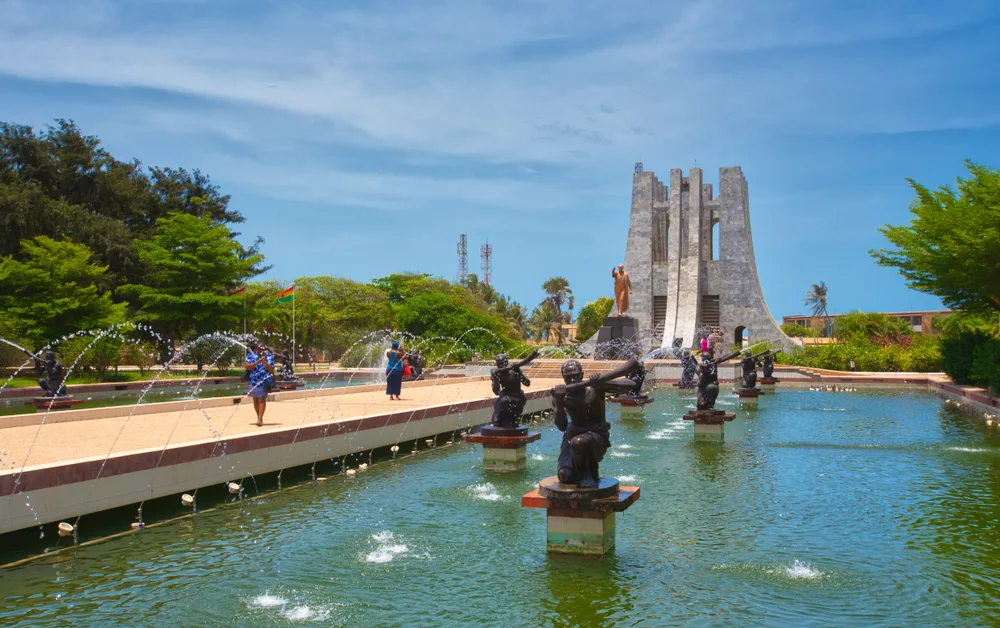
ACCRA,GHANA/MAY 1,2018: The Kwame Nkrumah Memorial Park and Mausoleum/Truba7113/Shutterstock
Here are some other things other people interested in traveling to Ghana wanted to know:
What should I avoid in Ghana?
Avoid traveling at night or exploring new parts of the city, as that is when most crime incidents occur. Avoid visiting deserted beaches alone as that is also a frequent locale for crime.
Is there a lot of crime in Ghana?
Ghana has a moderate rate of crime. However, this crime rate has been increasing over the past few years, causing many residents to feel concerned for their safety.
Is Ghana safe for female travelers?
According to some surveys, Ghana is one of the safest countries for female travelers in Africa. However, female travelers still experience inconveniences and dangers that their male counterparts do not, and there have been situations when female travelers were sexually assaulted.
Take extra care when moving around, especially at night. Beaches, in particular, are a source of danger for female travelers, so make sure there are always a few other people around.
Where is the safest place in Ghana?
Some of Ghana’s safer cities are the smaller towns such as Aburi, Tamale, and Cape Coast. Kumasi and Accra can also be safe as long as you stick to the right neighborhoods.
What are the top crimes in Ghana?
The most frequent crimes in Ghana are corruption, human trafficking, fraud, and domestic violence. Of these, fraud is the most likely to affect visitors, while locals bear the brunt of most other types of crime.
So, Is Ghana Safe to Visit?
The answer is relative. Ghana is one of the safer countries in Africa but might have more crime than your hometown or other tourist destinations that you’ve been to.
Make sure you take basic precautions and try to explore mostly during the day, and you should have an excellent time in Ghana. So what are you waiting for — book your trip and experience this storied for yourself!



